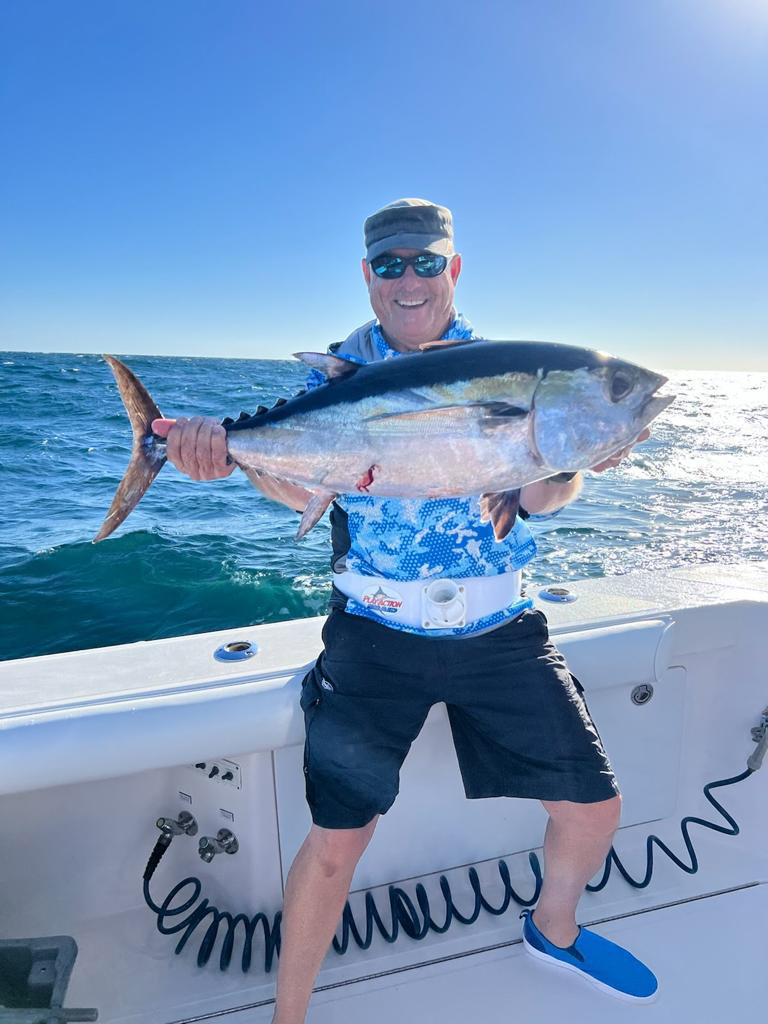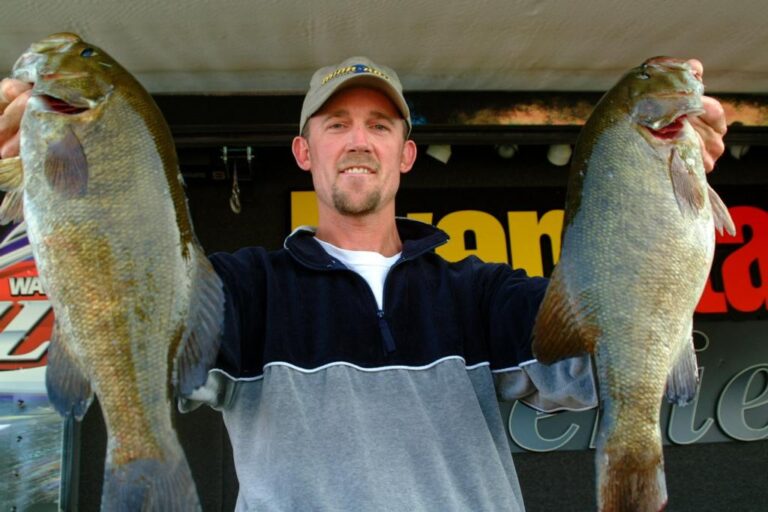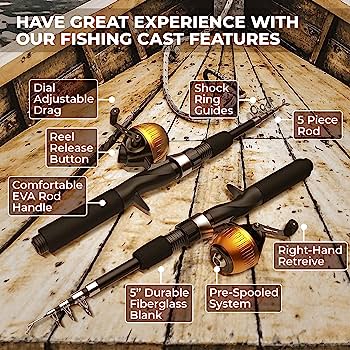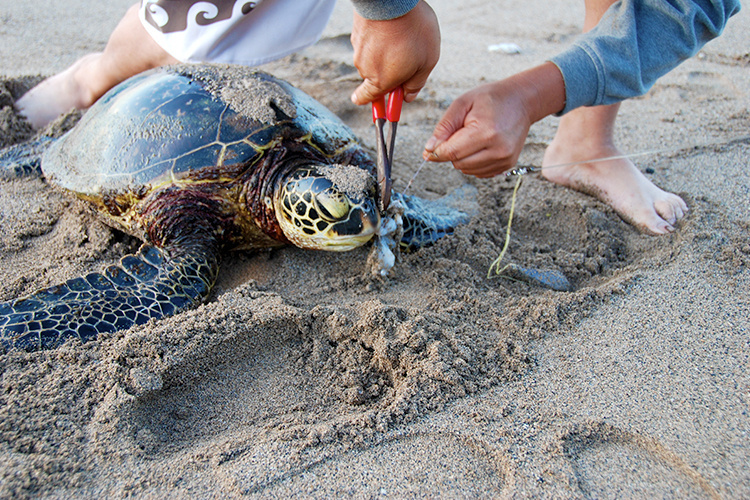Yes, pontoon boats are good for fishing due to their stability and spaciousness, making them ideal for anglers. A pontoon boat provides a stable platform for casting and reeling in fish, ensuring a comfortable and enjoyable fishing experience.
Additionally, the open deck design allows for ample space to move around and store fishing gear. With their versatility and maneuverability, pontoon boats are a popular choice among fishing enthusiasts for both freshwater and saltwater fishing excursions. Whether you enjoy fishing alone or with a group, a pontoon boat offers the convenience and comfort needed to have a successful day on the water.
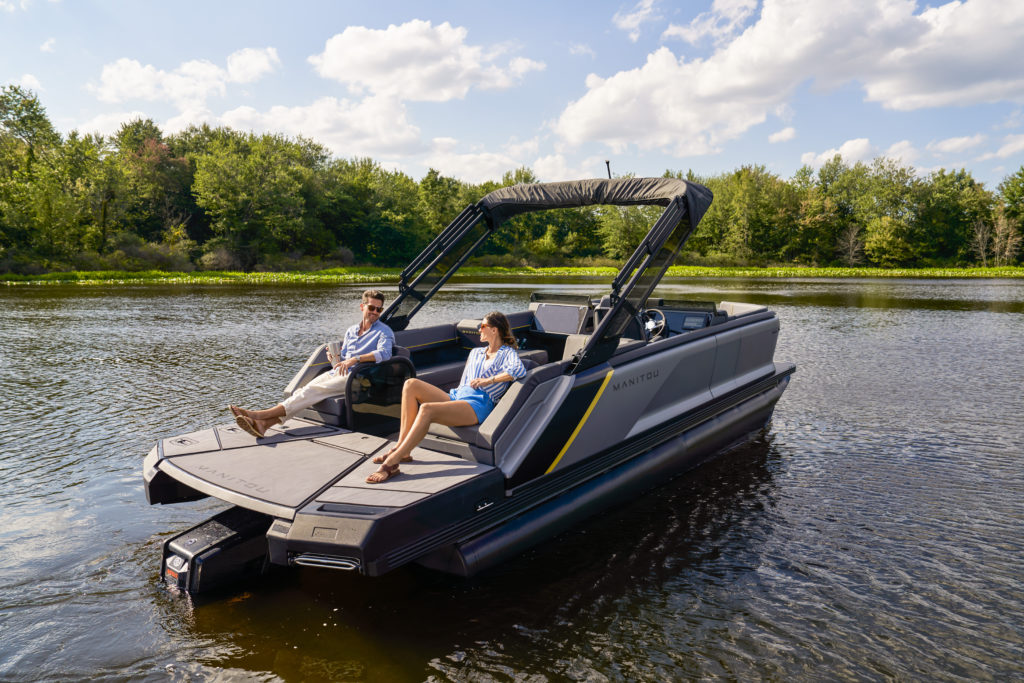
Credit: www.greatlakesscuttlebutt.com
Why Choose Pontoon Boats For Fishing
Are Pontoon Boats Good For Fishing?
Pontoon boats have become a popular choice among anglers for various reasons. Their unique design and features make them well-suited for fishing expeditions. In this section, we will explore why pontoon boats are a great option when it comes to fishing, focusing on their versatility, stability on the water, and ample storage space.
Versatility Of Pontoon Boats
Pontoon boats are incredibly versatile watercraft that can adapt to different fishing styles and environments. Here are some key points to consider:
- Maneuverability: With their flat-bottomed design, pontoon boats offer exceptional maneuverability, allowing you to navigate shallow waters and hard-to-reach fishing spots with ease.
- Customizability: Pontoon boats can be customized with various fishing-specific accessories and features, such as rod holders, fish finders, and livewells. This flexibility allows you to create the ideal fishing setup tailored to your preferences.
- All-season fishing: Pontoon boats are suitable for fishing in all seasons. Whether you’re casting your line in the calmness of spring or braving colder temperatures during winter, pontoon boats provide a stable and comfortable fishing platform.
Stability On The Water
One of the biggest advantages of pontoon boats for fishing is their exceptional stability on the water. Here’s why stability matters for anglers:
- Enhanced balance: Pontoon boats have two or three pontoons that offer superior balance compared to other types of boats. This stability minimizes the risk of tipping over, ensuring a safe and secure fishing experience.
- Reduced motion sickness: Due to their stable design, pontoon boats are less likely to rock or sway, making them ideal for individuals prone to motion sickness. You can focus on fishing without feeling seasick.
- Standing capability: Pontoon boats provide a stable deck that allows anglers to stand while casting or reeling in fish. This feature gives you better visibility and casting accuracy, enhancing your fishing success.
Ample Storage Space
When it comes to fishing, storage space is essential for carrying equipment, supplies, and your prized catch. Pontoon boats offer generous storage capacity, making them highly practical for anglers. Consider the following:
- Multiple compartments: Pontoon boats are equipped with multiple storage compartments, allowing you to organize your gear efficiently. You can store fishing tackle, bait, coolers, and other essentials within easy reach.
- Livewells: Many pontoon boats come with built-in livewells, specially designed to keep your catch alive and fresh. These compartments provide a convenient and humane way to store your fish until you reach the shore.
- Large deck space: The open deck layout of pontoon boats offers ample room for moving around and storing larger fishing equipment, such as coolers, chairs, and additional tackle boxes.
Pontoon boats provide a versatile, stable, and storage-friendly fishing experience. Whether you prefer freshwater or saltwater fishing, these boats offer the perfect combination of functionality and comfort. Consider investing in a pontoon boat for your next fishing adventure and discover the numerous benefits they bring to your angling pursuits.
Design Features That Make Pontoon Boats Ideal For Fishing
Pontoon boats have become increasingly popular among fishing enthusiasts. With their versatile design and a range of features, these boats provide a unique fishing experience. In this section, we will explore the design features that make pontoon boats ideal for fishing.
Spacious Deck Layout
One of the key advantages of pontoon boats for fishing is their spacious deck layout. Here are the main points to consider:
- Ample space: Pontoon boats offer a large and open deck area, providing plenty of room for anglers to move around and cast their lines comfortably.
- Storage capacity: These boats typically come equipped with built-in storage compartments and lockers, allowing anglers to keep their fishing equipment and supplies organized and easily accessible.
- Fishing gear arrangement: The spacious deck layout enables anglers to set up their fishing gear efficiently, ensuring easy access to rods, reels, tackle boxes, and other essentials.
Elevated Seating Options
Pontoon boats often come with elevated seating options, adding to their appeal for fishing enthusiasts. Here’s why elevated seating is beneficial:
- Enhanced visibility: With elevated seating, anglers have a better vantage point, allowing them to spot fish activity and navigate through different fishing spots with ease.
- Comfort and safety: Elevated seating provides better comfort during long fishing trips and improves safety by ensuring a clear view of the surroundings, reducing the chances of accidents or collisions.
Trolling Motor Compatibility
Trolling motors are essential for maneuvering silently and precisely in the water, especially when anglers want to maintain position or move at slow speeds. Pontoon boats are usually designed to accommodate trolling motors, and here’s why it matters:
- Silent operation: Trolling motors operate quietly, which prevents scaring away fish, especially in calm and shallow waters. This makes them ideal for anglers who prefer a less intrusive approach to fishing.
- Versatile fishing techniques: Trolling motors allow anglers to practice different fishing techniques, such as drift fishing or vertical jigging, by maintaining a constant speed or position.
Now that we’ve explored the design features that make pontoon boats ideal for fishing, you can see why they have gained popularity among anglers. With their spacious deck layout, elevated seating options, and compatibility with trolling motors, pontoon boats offer a comfortable and versatile fishing experience.
Whether you enjoy fishing alone or with friends and family, a pontoon boat may be the perfect vessel to enhance your fishing adventures.
The Pros And Cons Of Fishing On Pontoon Boats
Pontoon boats are a popular choice among fishing enthusiasts for their versatility and comfort. With their stable and spacious design, these boats offer several advantages for anglers looking to have an enjoyable fishing experience. However, like any other watercraft, pontoon boats also come with their fair share of drawbacks.
In this section, we will explore the pros and cons of fishing on pontoon boats.
Advantages Of Fishing On Pontoon Boats:
- Comfort and relaxation: Pontoon boats are known for their comfortable seating and ample space, providing anglers with a relaxing fishing experience. You can sit back, enjoy the scenery, and wait for the fish to bite without feeling cramped or uncomfortable.
- Accessibility to different fishing spots: Pontoon boats are designed to navigate various water bodies, including rivers, lakes, and ponds. Their shallow draft allows access to shallower waters where other boats might struggle to reach. This accessibility gives anglers the opportunity to explore different fishing spots and increase their chances of finding a productive fishing location.
- Ideal for family fishing trips: Pontoon boats are family-friendly and offer an excellent option for fishing trips with loved ones. With enough room for everyone, including children, you can make lasting memories while enjoying quality time together on the water.
Disadvantages Of Fishing On Pontoon Boats:
- Limited maneuverability in rough waters: While pontoon boats provide stability in calm waters, they may have limitations in rougher conditions. Due to their flat-bottom design, they can be less maneuverable compared to other boats like v-hulls. This can make it challenging to navigate and control the boat in choppy waters.
- Slower speeds: Pontoon boats are not typically known for their speed. If you’re looking for a fast-paced fishing experience, a pontoon boat may not be the best choice. These boats are more suitable for those seeking a leisurely fishing trip rather than a high-speed chase.
- Potential noise disruption: Pontoon boats often come with outboard motors, which can produce noise that may disturb fish in the water. While some models are designed to minimize noise, it’s essential to be mindful of the potential disruption caused by motor sounds when fishing in quieter, more serene environments.
Pontoon boats offer several advantages for fishing enthusiasts, providing comfort, accessibility, and family-friendly options. However, it’s crucial to consider the limitations of these boats, such as limited maneuverability in rough waters, slower speeds, and potential noise disruption. Ultimately, the suitability of pontoon boats for fishing depends on your preferences and the specific fishing conditions you anticipate.
Top Fishing Techniques For Pontoon Boat Anglers
Are you an avid angler looking to take your fishing game to the next level? Pontoon boats are a fantastic option for fishing enthusiasts, offering stability, ample space, and versatility on the water. In this section, we will explore some of the top fishing techniques that can be employed by pontoon boat anglers to maximize their success on every trip.
Whether you prefer drift fishing, casting and retrieving, or bottom fishing, these techniques will help you reel in more catches and create unforgettable fishing experiences. Let’s dive in!
Drift Fishing
Drift fishing is a popular technique among pontoon boat anglers, allowing you to cover a large area of water while presenting your bait or lure to a wider range of fish. Here are some key points to keep in mind for successful drift fishing:
- Position yourself upwind or upcurrent before starting your drift to ensure a natural presentation of your bait or lure.
- Let the natural drift of the water carry your pontoon boat along with it, while you actively work your bait or lure to entice fish.
- Vary your drift speed and direction to target different areas of interest, such as drop-offs, weed edges, or rocky structures.
Setting Up Anchors To Drift
To effectively drift fish from your pontoon boat, it’s crucial to set up your anchors properly. Follow these steps for anchor placement:
- Deploy your anchors at the bow and stern of your pontoon boat to minimize swinging and maintain control over the drift.
- Use an anchor system that allows for easy adjustment of anchor length, allowing you to adapt to changing water depths or flow speeds.
- Consider using drift socks or sea anchors to further enhance your drift control and stability in windy conditions.
Choosing The Right Baits And Lures
Selecting the appropriate bait or lure is essential for enticing fish to strike. Consider these factors when choosing your baits and lures:
- Research the local fish species and their preferred prey to determine the best bait options.
- Experiment with a variety of lures to mimic the natural behavior of different prey species.
- Adjust your bait or lure size, color, and action based on water conditions, time of day, and fish activity levels.
Casting And Retrieving
Mastering the art of casting and retrieving is key to tempting fish into biting. Follow these tips to improve your casting and retrieving technique:
- Practice your casting accuracy and distance to precisely target specific areas like submerged structures, weed beds, or visible fish activity.
- Vary your retrieval speed and pattern to mimic the movement of the prey and trigger a predatory response from the fish.
- Pay attention to any bites or strikes during the retrieve and adjust your technique accordingly.
Targeting Structure And Vegetation
Pontoon boats provide excellent access to structure and vegetation-rich areas where fish tend to congregate. Keep these points in mind when targeting structure and vegetation:
- Use fishfinders and maps to locate underwater structures such as submerged rocks, logs, drop-offs, or weed beds.
- Target visible vegetation such as lily pads, reeds, or submerged aquatic plants, as they provide shelter and a food source for fish.
- Employ techniques like flipping or pitching to place your bait or lure precisely into the targeted structure or vegetation pockets.
Perfecting Your Cast
A well-executed cast can make a significant impact on your fishing success. Consider these tips to perfect your cast:
- Focus on the accuracy and distance of your cast, aiming for specific targets or areas likely to hold fish.
- Practice different casting techniques, such as sidearm, overhead, or roll cast, to adapt to various fishing scenarios.
- Utilize proper rod and reel setup and technique for maximum casting distance and control.
Bottom Fishing
Bottom fishing is a productive technique when targeting species that dwell close to the lake or riverbed. Follow these guidelines for successful bottom fishing:
- Use sinkers or weights to bring your bait or lure to the desired depth, keeping it closer to the bottom where the fish are likely to be.
- Deploy different bottom fishing rigs, such as carolina rigs, drop shots, or jigging setups, to effectively present your bait or lure in a natural and enticing manner.
- Monitor your line for any subtle twitches or movements that indicate a fish nibbling on your bait, and be prepared to set the hook.
Anchoring Strategies
Anchoring your pontoon boat can be advantageous, especially when targeting specific areas or waiting for fish to show activity. Consider these anchoring strategies:
- Identify prime fishing spots, such as deep holes, underwater structures, or areas with heavy current, and position your boat accordingly.
- Use a sturdy anchor with sufficient weight to ensure your pontoon boat stays in place, even in variable weather or water conditions.
- Consider using multiple anchors or deploying an anchor drogue for additional stability and control in high winds or strong currents.
Choosing The Right Tackle
Selecting the appropriate tackle is vital for optimizing your chances of landing fish. Take note of these factors when choosing your fishing tackle:
- Match your tackle to the target species, considering their size, feeding patterns, and habitat.
- Use fishing lines with appropriate strength and visibility for the water conditions and the species you are pursuing.
- Experiment with different hook sizes, styles, and bait presentations to determine the most effective setup for your desired catch.
With these top fishing techniques for pontoon boat anglers in your arsenal, you’re well-equipped to make the most of your time on the water. Remember to adapt your approach based on the prevailing conditions and the behavior of the fish.
Now, go out there and enjoy the thrill of reeling in your next big catch from the comfort and versatility of your pontoon boat!
Essential Fishing Equipment To Have On Your Pontoon Boat
Pontoon boats are becoming increasingly popular among fishing enthusiasts for their stability and ample deck space. If you’re considering getting a pontoon boat for fishing, it’s important to know what essential equipment you should have on board. In this section, we’ll explore the key fishing equipment that will enhance your fishing experience on a pontoon boat.
Fishing Rods And Reels
Investing in the right fishing rods and reels is crucial for a successful fishing trip on a pontoon boat. Here are some key points to consider:
- Choose fishing rods and reels that are suitable for the type of fish you intend to catch.
- Opt for lightweight and versatile rods that can handle a range of fishing techniques.
- Consider the length and power of the fishing rod based on your preferred fishing style and target species.
- Use spinning reels or baitcasting reels depending on your experience level and fishing preferences.
- Carry multiple rods and reels with different line strengths to accommodate various fishing situations.
- Don’t forget to bring spare fishing line, as well as tools for line cutting and knot tying.
Tackle Box Organization Tips
A well-organized tackle box is essential for easy access to your fishing gear and increasing efficiency on your pontoon boat. Here are some tips to keep your tackle box in order:
- Categorize your fishing tackle based on their types, such as hooks, sinkers, bobbers, and lures.
- Use compartments or dividers within your tackle box to separate different types of fishing tackle.
- Label each compartment for quick identification of your fishing gear.
- Arrange your fishing tackle based on frequency of use, with frequently used items placed at the top or front of the tackle box.
- Keep your tackle box clean and free from rust by wiping down your gear after each fishing trip.
- Consider using a waterproof tackle box to protect your gear from water damage.
Fish Finders And Gps Navigation Systems
Fish finders and gps navigation systems are valuable tools for locating fish and navigating waterways. Here’s why you should consider equipping your pontoon boat with these devices:
- Fish finders use sonar technology to detect underwater objects, including fish and structures, helping you determine the best spots to fish.
- Gps navigation systems provide accurate location tracking, ensuring you never lose your way on the water.
- Some advanced fish finders combine gps navigation, mapping, and fish tracking functions into a single device.
- Look for fish finders and gps systems with user-friendly interfaces and bright displays for easy operation.
- Choose devices that are suitable for your pontoon boat’s size and the depth of the waters you intend to fish in.
- Familiarize yourself with the functionalities of these devices through the manufacturer’s instructions or online tutorials.
Investing in the right fishing equipment and organizing it properly on your pontoon boat can make a significant difference in your fishing success. So, make sure you have the appropriate fishing rods and reels, keep your tackle box well-organized, and consider adding fish finders and gps navigation systems to enhance your fishing experience.
Now, you’re ready to set sail and enjoy a day of fishing on your pontoon boat!
Maintenance And Care Tips For Pontoon Boats Used For Fishing
Pontoon boats are a popular choice for fishing enthusiasts due to their stability, spaciousness, and versatility. However, like any other watercraft, pontoon boats require regular maintenance and care to ensure they remain in top-notch condition for your fishing adventures. In this section, we will discuss some essential maintenance and care tips for pontoon boats used for fishing.
Cleaning And Removing Fish Smell
Keeping your pontoon boat clean is essential not only for aesthetics but also for its longevity. After a successful fishing trip, it’s crucial to clean your boat thoroughly and remove any lingering fish smell. Here are some tips to help you with this task:
- Rinse the boat with fresh water after each fishing trip to remove any saltwater or debris that may have accumulated.
- Use a mild soap or boat cleaner to wash the pontoon, ensuring you remove all dirt, slime, and fish scales.
- Pay extra attention to the areas where fish were cleaned, as they tend to harbor strong odors. Scrub these areas with a mixture of baking soda and water to neutralize smells.
- To eliminate fish smell from the carpet or upholstery, sprinkle baking soda over the affected areas and let it sit for a while before vacuuming.
- Consider using odor-absorbing products, such as charcoal or odor eliminators specifically designed for boats, to keep your pontoon smelling fresh.
Regular Inspection Of Boat Components
To ensure a safe and enjoyable fishing experience, it’s crucial to regularly inspect various components of your pontoon boat. By doing so, you can identify potential issues early and take appropriate actions. Here are some key components to inspect:
- Check the pontoons for any signs of damage, such as dents, cracks, or leaks. Address these issues promptly to prevent further damage or water intrusion.
- Inspect the deck and flooring for any soft spots or signs of wear. Replace or repair any damaged sections to maintain the structural integrity of the boat.
- Examine the electrical system, including the battery, wiring, and lights, to ensure everything is functioning properly. Replace any faulty components and check for loose connections.
- Inspect the steering mechanism, throttle, and controls to ensure they operate smoothly. Lubricate any moving parts as necessary.
- Check the fuel system, including hoses and filters, for any signs of leaks or clogs. Replace worn-out components and ensure the fuel tank is properly secured.
Protecting Against Rust And Corrosion
As a vessel used in water, pontoon boats are susceptible to rust and corrosion. Protecting your boat against these elements will prolong its lifespan and maintain its appearance. Consider the following tips:
- Wash your boat regularly and thoroughly dry it to prevent the accumulation of moisture, which can accelerate rust formation.
- Apply a protective wax or polish to the metal components, such as railings and hinges, to create a barrier against water and corrosion.
- Inspect the anodes or sacrificial zincs on your pontoon boat and replace them when necessary. These sacrificial metals help prevent corrosion by sacrificing themselves instead of other essential parts of the boat.
- Keep your boat covered when not in use to shield it from the damaging effects of sun, rain, and saltwater.
- Rinse the boat trailer thoroughly after each use, as it can also be prone to rust and corrosion.
By following these maintenance and care tips, you can ensure that your pontoon boat remains in optimal condition for fishing trips. Regular cleaning, inspections, and protection against rust and corrosion will not only extend the longevity of your boat but also contribute to a safer and more enjoyable fishing experience.
How To Optimize Your Pontoon Boat For The Best Fishing Experience
When it comes to fishing, having the right equipment is essential to ensure a successful and enjoyable experience. If you own a pontoon boat, you may be wondering how to optimize it for fishing. Fortunately, there are several custom accessories and modifications you can make to turn your pontoon boat into a fishing machine.
In this section, we will explore three key ways to enhance your pontoon boat for the best fishing experience.
Adding Custom Accessories
One of the best ways to optimize your pontoon boat for fishing is by adding custom accessories. Here are some must-have accessories that can make your fishing trips more convenient and productive:
- Fishfinder: Installing a high-quality fishfinder can help you locate schools of fish and identify the water depth. This tool will significantly improve your chances of finding the ideal fishing spot.
- Trolling motor: A trolling motor allows you to move silently through the water, enabling precise control over your boat’s movement. It is especially useful when fishing in shallow waters or areas with strong currents.
- Livewell: Having a livewell on your pontoon boat is crucial for keeping your catch fresh and alive. This accessory ensures that your fish stay in optimal condition until you return to shore.
- Anchor system: To maintain stability and ensure a steady fishing position, consider investing in an anchor system specifically designed for pontoon boats. This will prevent your boat from drifting with the current and keep you in the targeted fishing area.
Installing Fishing Seats And Rod Holders
Comfort is key when spending long hours on the water, and having the right seating and rod holders is essential for an enjoyable fishing experience. Consider the following options:
- Swivel seats: Swivel seats allow for a 360-degree view, ensuring you can easily track fish movement and cast your line in any direction. Opt for comfortable, padded seats for added convenience.
- Fishing rod holders: Install rod holders strategically around your pontoon boat to keep your rods secure and within easy reach. This allows you to fish hands-free and helps prevent any accidental damage to your equipment.
Maximizing Storage Space
Adequate storage space is crucial when it comes to carrying all your fishing gear and ensuring a clutter-free fishing deck. Here are some tips for maximizing storage space on your pontoon boat:
- Underseat storage: Consider adding customized storage compartments under the seats to store tackle boxes, extra fishing rods, life jackets, and other essential equipment.
- Tackle stations: Install tackle stations with drawers and compartments to keep your fishing tackle organized and easily accessible.
- Overhead storage nets: Utilize the space above your seating area by installing overhead storage nets. These nets provide an ideal spot to stow bulky items like rain gear, coolers, or extra clothing.
By adding custom accessories, installing fishing seats and rod holders, and maximizing storage space, you can optimize your pontoon boat for the best fishing experience. These modifications will not only enhance your comfort but also improve your chances of a successful day on the water.
So, gear up your pontoon boat and get ready for unforgettable fishing adventures!
The Future Of Pontoon Boats In The Fishing Industry
Pontoon boats have become a popular choice among fishing enthusiasts in recent years. With their spacious decks, stability, and comfort, these boats offer an excellent platform for anglers to enjoy their favorite pastime. But what does the future hold for pontoon boats in the fishing industry?
In this section, we will explore the technological advancements, eco-friendly innovations, and the increasing popularity of pontoon boats among anglers.
Technological Advancements
- Gps navigation: Many pontoon boats now come equipped with gps navigation systems, making it easier for anglers to navigate unfamiliar waters and find the best fishing spots.
- Fish finders: Advanced fish finders allow fishermen to locate fish more accurately by providing information on the depth, temperature, and presence of fish in the water.
- Livewell systems: Improved livewell systems in pontoon boats ensure the proper oxygenation and care for captured fish during long fishing trips.
Eco-Friendly Innovations
- Electric propulsion: Electric-powered pontoon boats are gaining popularity due to their environmentally friendly nature. These boats produce zero emissions and are much quieter, minimizing their impact on marine ecosystems and surrounding wildlife.
- Solar panels: Some pontoon boats are now equipped with solar panels, which can help power various onboard systems, reducing the reliance on conventional energy sources.
- Sustainable manufacturing: As environmental awareness grows, manufacturers are incorporating sustainable materials and production practices, making pontoon boats more eco-friendly.
Increasing Popularity Among Anglers
- Versatility: Pontoon boats provide versatility for anglers, allowing them to participate in a wide range of fishing activities, such as trolling, casting, and jigging. The spacious decks accommodate multiple anglers without compromising comfort.
- Family-friendly: Pontoon boats create a family-friendly environment, making it easier for fishing enthusiasts to share their passion with loved ones. The ample seating, shade options, and amenities make it an enjoyable experience for all ages.
- Customizability: With a wide range of options available, anglers can customize their pontoon boats to suit their specific fishing needs. From rod holders and fishing chairs to bait stations and rod lockers, anglers can tailor their boats to optimize their fishing experience.
The future of pontoon boats in the fishing industry looks promising. Technological advancements such as gps navigation and fish finders, along with eco-friendly innovations like electric propulsion and solar panels, contribute to the sustainability and efficiency of these boats. Furthermore, the increasing popularity among anglers, driven by the versatility, family-friendly nature, and customizability of pontoon boats, ensures a bright future for this type of vessel in the fishing industry.
So, if you’re a fishing enthusiast looking for a comfortable and efficient fishing platform, a pontoon boat could be your ideal choice.
Conclusion
Pontoon boats offer an excellent option for fishing enthusiasts, providing a versatile and enjoyable experience on the water. With their stability, ample space, and convenient features, these boats are well-suited for fishing purposes. Anglers can appreciate the comfortable seating arrangements, thoughtful storage options, and customizable options available with pontoon boats.
The quiet nature of the electric motor models also ensures a peaceful fishing experience, without disturbing the fish. Furthermore, the versatility of pontoon boats allows for fishing in various environments, including lakes, rivers, or even offshore. Whether you prefer casting lines or trolling for larger catches, pontoon boats provide a reliable and efficient platform for your fishing needs.
So, if you’re looking for a fishing boat that offers flexibility, comfort, and functionality, a pontoon boat may be the perfect choice for you. Get ready to enjoy endless hours of fishing and create lasting memories on the water with a pontoon boat.

